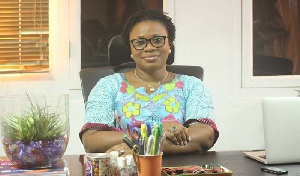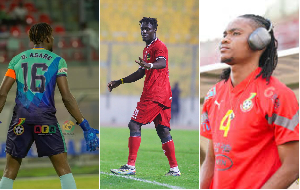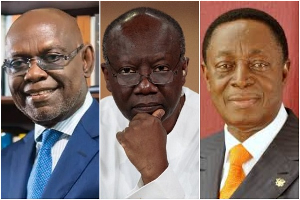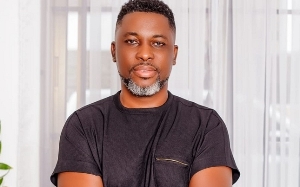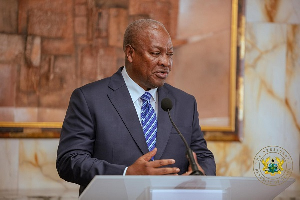“Charlotte Osei, the current Electoral Commission boss is not lazy and she is not dumb and she definitely won't trade her body for excellence,” Franklin Cudjoe head of policy think-tank IMANI Ghana has stated.
Mr. Cudjoe’s statement comes after allegations by NPP Member of Parliament for Assin Central Kennedy Agyepong that Mrs. Osei was appointed because she yielded to sexual lusts of some bigwigs in government.
His comments have been widely condemned by some Ghanaians who describe his utterances as disrespectful and insulting to women in general.
In a statement, Mr. Cudjoe said the derogatory remarks by the NPP firebrand are regrettable and urged people who disagree with the EC boss to stop insulting her.
Below is the full statement by Franklin Cudjoe
Mrs. Charlotte Osei, the current EC boss is not lazy and she is not dumb and she definitely won't trade her body for excellence.
It is regrettable if true the derogatory comments allegedly made by a sitting MP about her womanhood. Some of us do in fact, believe Charlotte is not doing well as current EC boss and I am very surprised given her stellar performance as the recent boss of the NCCE.
Last year, she and the NCCE made it to the second position out of 45 Ministries, Departments and Agencies ranked by the annual IMANI Public Sector Leadership Awards.
IMANI ranks but singles out only the top 5 most inspirational public sector leaders for mention.
Below is what got Charlotte to the top.
NATIONAL COMMISSION FOR CIVIC EDUCATION (NCCE)
The primary mandate of the NCCE is to educate Ghanaians on all matters of civil affairs. The rather broad array of civic affairs means the organization has a rather difficult mandate particularly given a large number of illiterate or partially illiterate Ghanaians.
This fact, coupled with the fact that the Government budget allocation is woefully inadequate makes its task even more nebulous. As we speak the commission does not even have its own head office. Their key staff are literally ‘perching’ at the Electoral Commission’s head office.
These challenges notwithstanding, the Commission has consistently strived to deliver on its mandate as best it can. Under the year in review (October 2014- October 2015), the organization had been quite busy particularly as a result of the fact that there was the District level Election in 2015.
During the run-up to these elections, the Commission was at the forefront educating Ghanaians across the length and breadth of the country on the need to take the elections seriously because local assemblymen are the closest representatives of the Executive to the people.
Beyond that, the commission also educated Ghanaians to vote more women and other minorities in the district level elections as research indicates that they are better leaders.
The Commission has further deepened its engagement with local communities all over the country by organizing several Town hall meetings, Local ‘IPAC’ meetings of local executives of political parties across the country in a bid to create a harmonious environment in the lead up to the 2016 elections.
The Commission has also launched special quizzes and debates specifically on the constitution in basic and second cycled institutions across the country also in a bid to fulfill its mandate of educating Ghanaians on all civic-related issues. It scored 65% under the Public Engagement Pillar.
The Commission has also improved radically as far as technology usage is concerned. It currently stores majority of its documents electronically.
Also, the Commission is using its website and social media pages to adequately engage the Ghanaian public.
This is all quite commendable particularly at a time when a good number of public agencies do not even have websites. Quite clearly, the organization undertakes proper research. This is evident in the number of different publications NCCE released in the period under review.
It is instructive to note that the organization was one of the first to do a nation-wide survey that indicated that majority of Ghanaians wanted to vote for their DCE’s instead of having them appointed by the President. The Organization’s own internal management has been good over the period as well. Its level of transparency is also commendable.
It constantly publishes annual report on its website, in which a detailed financial report of the year under review is given. It scored 73% and 86% respectively under the Promise of
Transformation and Independence pillar.
Despite the many positives the Commission has chalked there still remains a lot it has to do to build its status as a really top institution. Crucially, the Commission has to find a way to make its finances more sustainable.
Currently, it heavily relies on Donor generosity which is clearly problematic. Perhaps, the Commission may have to exert itself more to ensure that it gets its ‘due’, from the Government.
Furthermore, the Commission has to do more to exert its influence in the most urban parts of the country.
There seems to be a lot of focus on more less-urban (rural) parts of the country. While the logic in this approach is easy to understand, it has led to many in Accra, for instance, assuming that the Commission is not working.
The commission has to note that civil unrest rarely ever starts from rural areas hence the need to double up its efforts in the urban areas. In a nutshell, the overall activities of the commission has been very commendable over the period under review and certainly deserves the award as there’s a lot other similar agencies can learn from.
So, by all means, disagree and get angry with Charlotte but do not insult her!!!
General News of Tuesday, 28 June 2016
Source: starrfmonline.com

